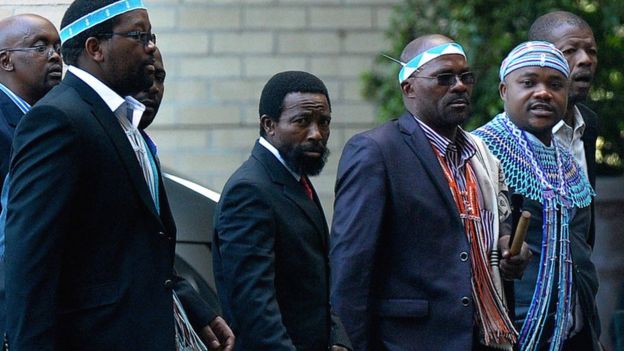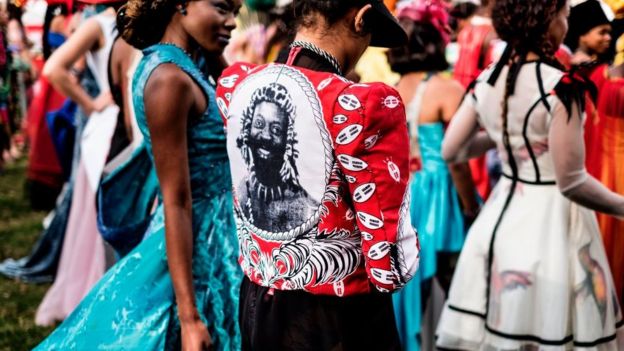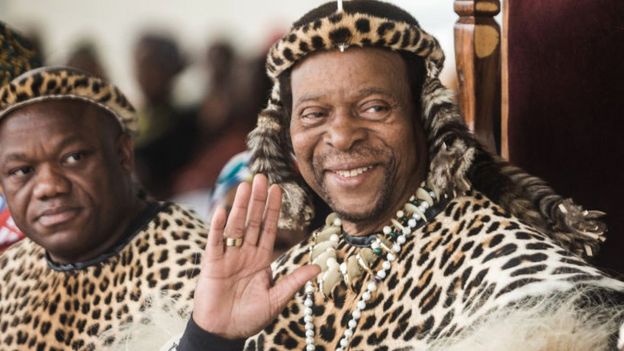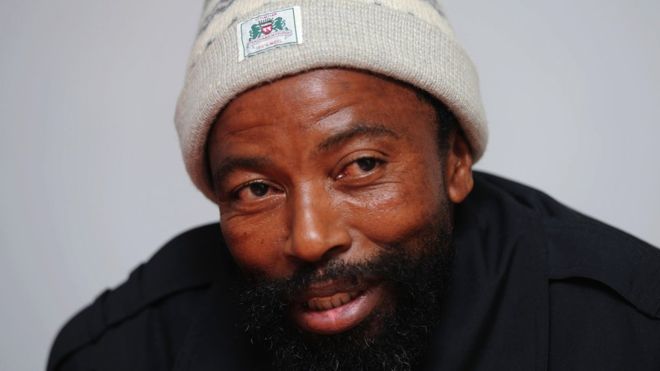A South African king, a nephew of the late Nelson Mandela, has been arrested after allegedly going on the rampage with an axe in the palace.
Buyelekhaya Dalindyebo, freed from jail on parole in December, broke into the Thembu royal palace in the early hours.
Witnesses said he was searching for his son, the regent, who was appointed the acting monarch while he was in prison.
The regent escaped through a window, but his wife has been injured and taken to hospital, a royal spokesman said.
King Dalindyebo was sentenced to 12 years in jail for kidnapping, assault and arson, but only served four years after the president granted some prisoners early parole last year.
He was the first monarch to be convicted of a crime in South Africa since white-minority rule ended in 1994.
The 56-year-old comes from the Thembu clan, to which Mr Mandela, South Africa's first black president, belonged.
South Africa has seven officially recognised monarchs representing different ethnic groups and clans.
'People were running for their lives'
Since King Dalindyebo's release from jail, there have been tensions in the Thembu royal family and he has refused to see his son, acting King Azenathi Zanelizwe Dalindyebo.
Last month, the royal household decided that Azenathi should continue on as regent for at least another year, South Africa's City Press paper reported.

Royal spokesman Prince Siganyeko Dalindyebo said the king had broken into the palace - Bumbane Great Place, just outside the town of Mthatha in Eastern Cape Province - at around 03:00 local time (01:00 GMT) on Friday morning.
"He was carrying weapons such as [an] axe, a machete and also a crowbar. He managed to break a window from the sitting room of the main house," he told public broadcaster SABC.
"As he was moving up the stairs looking for the acting king, some people managed to distract him and then the acting king managed to jump out of a window, running for safety."

Other people were also running for their lives, the prince said.
"He has wreaked havoc in the palace… he started ransacking the king's room, all confidential documents - he threw them around."
Video footage shows the troubled monarch later standing outside his palace, calmly smoking a cigarette, and daring the police to arrest him, which they eventually did.
The king was jailed in 2015 after being convicted of assaulting his subjects during a "reign of terror" in the 1990s.
He had kidnapped a woman and her six children, set their home on fire and beaten up four youths, one of whom died because one of their relatives had failed to present himself before the king's traditional court.

If his behaviour has often proved extreme, it nonetheless poses some fundamental questions about the role of traditional leaders in modern, post-apartheid South Africa: their entitlements, public funding, the feudal nature of their control and, above all, in this case, the extent to which their royal titles grant them impunity.
As well as the formally recognised monarchs, South Africa has thousands of other traditional leaders - headmen and chiefs - who continue to enjoy widespread respect, particularly in rural areas, and who are often called to mediate in civil disputes within their clans.
During the decades of racial apartheid, the white-minority government sought to strengthen the role of royal families, seeking to play them off against the broader and much more threatening liberation movement led by the African National Congress (ANC).

But in recent years - and after multiple royal scandals - some South Africans have begun to question the sustainability of the traditional system, not least when it comes to issues like the semi-feudal control that Zulu King Goodwill Zwelithini still enjoys over vast areas of land that he rents out to his subjects.
King Zwelithini - whose outspoken views on immigrants and sex education along with his lavish lifestyle have often been criticised - has, like King Dalindyebo, repeatedly challenged the authority of South Africa's democratic government.
The country's royal families face no immediate challenge to their authority, and many South Africans may shrug off King Dalindyebo as an embarrassing outlier.
But after this latest incident, plenty of people will be watching closely to see how fairly, or leniently, he will be treated by prosecutors.
Latest Stories
-
Isaac Botsio clocks 9.94s to win NCAA DII
19 minutes -
Expert urges calm over mosquito disease found in UK
28 minutes -
Russia intensifies strikes across Ukraine
30 minutes -
Godfred Dame, Thaddeus Sory, and the Anatomy of a Legal Heartbreak
1 hour -
Real 24 Hours crowned champions of inaugural Betway Tumu Community Cup
3 hours -
Trump, Malema, Ramaphosa and the Oval Office grill
3 hours -
Godfred Dame ‘replies’ Thaddeus Sory over ‘personal attacks’
4 hours -
‘We did not sign up for this’: Harvard’s foreign students are stuck and scared
5 hours -
A record number of Americans applied for UK citizenship as Trump began his second term
5 hours -
Denmark raises retirement age to 70 — the highest in Europe
5 hours -
Dr. China rejects Kwabena Agyapong’s top-down election proposal for NPP
5 hours -
These companies will raise prices because of Trump’s tariffs
6 hours -
UNTWO election: PABF urges Africa to back UAE’s Al Nowais bid to be first Secretary-General
6 hours -
Two in court over forged Judicial Service documents and stamps
6 hours -
Black Stars could miss key players for 2025 Unity Cup – Dr Randy Abbey
14 hours

